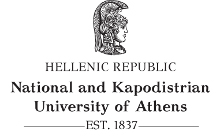Workshop: Language Change in Indo-European
Wednesday, July 31st, 2019
Session 1
09:30-10:00
How constructions in the passive voice contribute instrumentally to controversy
Eugene Green
Boston University
10:00-10:30
Old English Verbs of Motion. Meaning Components and Argument Realization
Sara Domínguez Barragán
University of La Rioja
10:30-11:00
Old English Adverbs: Extraction and Lemmatization with YCOE
Yosra Hamdoun Bghiyel
Universidad de La Rioja
11:00-11:15 Short Break
Session 2
11:15-11:45
The (pre-)history of the Old Norse adjectival article
Alexander Pfaff
University of Oslo
11:45-12:15
Syntactic constraints on negative contracted verbs in early English and early High German
Isabella Greisinger
Universität Düsseldorf
12:15-12:45
Morphological simplification in the late Northumbrian dialect: the case of weak verbs class II
Elisa Ramírez Pérez
Cardiff University
12:45-13:00 Short break
Session 3
13:00-13:30
Aspectual projections in temporal and spatial PPs and inherent Case in Greek
Manuel Español-Echevarría
Université Laval
13:30-14:00
Why do words change? The case of the terms for the upper limbs
in Greek and other Indo-European languages.
Iván Andrés-Alba
Universidad Autónoma de Madrid
14:00-14:30
Absolute constructions in Greek
Vassilios Spyropoulos
National and Kapodistrian University of Athens
14:30-15:10 Light Lunch
Session 4
15:10-15:40
Reconstructing the syntax of PIE participles: Evidence from the periphrastic construction
Thanasis Giannaris & Nikolaos Pantelidis
National & Kapodistrian University of Athens
15:40-16:10
Gender-assignment as a marker of Differential Object Marking
Letizia Vezzosi
University of Florence
16:10-16:40 [cancelled]
The diachrony of psychological predicates in Portuguese: from zero to dative back to zero
Ana Regina Vaz Calindro
UFRJ, Rio de Janeiro
16:40-17:00 Short break
Session 5
17:00-17:30
On VS in Hittite and beyond: methodological challenges
Eugenio Goria
Università di Torino
17:30-18:00
The RUKI-rule and the early Indo-Iranian-Uralic contacts
Sampsa Holopainen
University of Helsinki
18:00-18:30
Why we should not expect too much from computational-phylogenetic dates
Igor Yanovich
Universität Tübingen
18:30 Village excursion (Evening in a village)
******************************************************************************
BOOK OF ABSTRACTS: here
******************************************************************************
The 4th Naxos Summer School on Language Variation and Change in Ancient and Medieval Europe (July 28 – August 3, 2019) will be organizing a workshop on “Language Change in Indo-European”, to be held on July 31, 2019.
Abstracts that approach change in Indo-European languages (from Proto-Indo-European to daughter languages, or in Indo-European branches) from any perspective are welcome, including: historical morpho-syntax, historical phonology, historical pragmatics, historical sociolinguistics.
The rich historical data of Indo-European languages offer a stable basis for the formation and validation of language change theories, and mainly for those analyzing the direction of change.
The idea of the workshop is to offer our summer schools participants as well as other scholars interested in a systematic study of change in Indo-European languages, the opportunity to present their ongoing research or the results of their studies on change and its directions in the Indo-European family. We encourage papers of both data- and theory-oriented approaches. Presentations will last 20 minutes, allowing 10 minutes for discussion.
The issues to be addressed in the workshop include the following topics:
(i) new perspectives on phonological or morpho-syntactic reconstruction of Proto-Indo-European;
(ii) new analyses of long-standing questions that concern, for instance, gender-animacy-number, diathesis-voice, cases and alignment, finiteness and non-finiteness, prepositions-postpositions-prefixes in Indo-European;
(iii) new approaches to the study of features (isoglosses) that are shared by more than one Indo-European branches;
(iv) new methods of analyzing the directions of (phonological/ morpho-syntactic/ lexical/ pragmatic) change in Indo-European;
(v) new trends in computational Indo-European linguistics (and computational cladistics).
Please email your 350-words (excluding references) abstract to Elly van Gelderen (ellyvangelderen@asu.edu), Alexander Bergs (abergs@uos.de), Nikolaos Lavidas (nlavidas@enl.uoa.gr), by April 15, 2019. Deadline Extension: May 10, 2019
Registration fee only for the workshop: 30 euros
Registration fee for summer school + workshop: 190 euros, it also covers the light lunches for the whole period of the summer school.
On abstract models: Participants may consult the following SLE and LSA webpages:
http://sle2019.eu/how-to-write-a-good-abstract
https://www.linguisticsociety.org/resource/model-abstracts
Elly van Gelderen, Alexander Bergs, Nikolaos Lavidas
